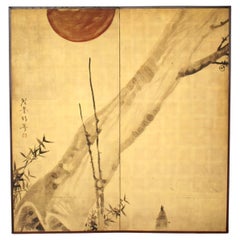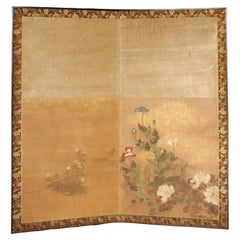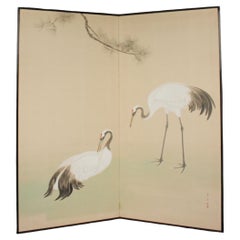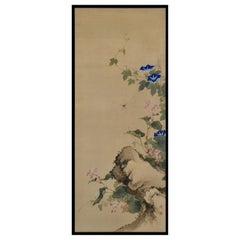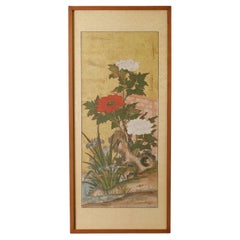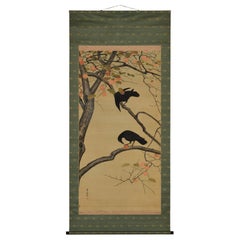Japan - Paintings and Screens
to
218
1,087
447
169
49
24
1
27
58
84
49
36
12
11
1
2
9
2
9
6
2
121
97
91
58
57
215
204
201
3
218
215
216
29
2
1
Item Ships From: Japan
JapaneseAntiques Terasaki kogyo, Gold background, Bamboo and plum folding screen
Located in Niiza, JP
material: paper and cloth
Unfolded size: 1600 x 1660 mm
Can be folded in half: 800 x 1660 mm, 6 kg
Estimated packing size: (Sandwich with 12mm plywood)
10 × 95 × 185cm 30kg
A bold ...
Category
20th Century Japan - Paintings and Screens
Materials
Paper
B31 Japanese Antiques 2panels, paper, folding Screen with flower
Located in Niiza, JP
Material: paper on wooden frame
One piece: W755×H1520mm×D15mm,
Unfolded size: W1510mm
Folded size: W755×H1520×D30mm, 5kg
Packaging (sandwiched with 5-10mm plywood): 15cm x 86cm x 16...
Category
19th Century Japanese Antique Japan - Paintings and Screens
Materials
Paper
B20 Japanese Antiques 2panels, Paper, folding Screen with Pine Tree and Crane
Located in Niiza, JP
Pine Trees and Cranes
Materials: Paper on Wooden Frame, Colored
One piece: W865×H1760mm,
unfolded size: W1730mm, 6kg
Folded size: W865×H1760×D35mm
packaging estimate (sandwiched with...
Category
Early 20th Century Japanese Japan - Paintings and Screens
Materials
Paper
Mid 19th Century Framed Japanese Painting. Spider & Morning Glory.
Located in Kyoto, JP
Obata Tosho (1812-1886)
Spider & Morning Glory
Late Edo period, mid 19th Century
Framed Japanese Painting. Ink and color on paper.
Individually framed 19th century bird and flowe...
Category
Mid-19th Century Japanese Edo Antique Japan - Paintings and Screens
Materials
Paper
Edo Period (19th) Japanese antique painting of flowers
Located in Fukuoka, JP
Japanese antique painting of flowers 19 C
Weight 3kg ( 6.6lb)
Category
Mid-19th Century Japanese Edo Antique Japan - Paintings and Screens
Materials
Silk, Paper
Early 20th Century Japanese Nihonga Scroll. Crow & Persimmon.
Located in Kyoto, JP
Anonymous.
Crows & Persimmon
Japanese Scroll. Pigments and Ink on Silk.
Dimensions:
Scroll: H. 235 cm x W. 106 cm.
Image: H. 168 cm x W. 86 cm.
Bird and flower paintings are oft...
Category
Early 20th Century Japanese Taisho Japan - Paintings and Screens
Materials
Silk
Japanese Painting, Hanging Scroll, 19th Century Bamboo in Moonlight
Located in Kyoto, JP
Bamboo in moonlight
Gamo Rakan (1784-1866)
Hanging scroll, ink on silk.
Dimensions:
Scroll: 201 cm x 58 cm
Image: 137 cm x 45 cm
In this early 19th century work by Gamo Rakan a light ink wash applied to the silk background silhouettes the moon and suggests the atmosphere of early evening. Even though it is a literati subject, Rakan’s bamboo is quite realistic with a strong decorative style. The painting finds its inspiration from Chinese Ming dynasty painters who often used a single-tone, jet black stroke to emphasize the calligraphic nature of bamboo.
In a different era, decorative would have been seen as somewhat unrefined. But increasingly in the Edo period, it was the hallmark of high style. The Japanese people, in particular the rising merchant class, had gradually become apathetic toward the traditional Sesshu and Kano schools of painting. Chinese professional and amateur painters living in the port of Nagasaki during the 18th century had a profound effect on Japanese painting and the freshness of their style and its decorative appeal contributed greatly to its popularity. Gamo Rakan’s teacher, Tani Buncho...
Category
Early 19th Century Japanese Edo Antique Japan - Paintings and Screens
Materials
Silk
B20 Japanese Antiques 6panels, Silver Paper, folding Screen
Located in Niiza, JP
Silver-covered folding screen
Material: Paper on wooden frame
One piece: W600×H1745mm×D20mm,
Unfolded size: W3630mm
Folded size: W615×H1745×D105mm, 12kg
Packaging (sandwiched with 5m...
Category
20th Century Japanese Japan - Paintings and Screens
Materials
Paper
Korean Painting, Wall Panel, 17th Century Ink Grapevine
Located in Kyoto, JP
Grapevine
Anonymous. Korean, 17th century.
Wall panel, ink on paper.
Upper seal:
Kou Kinun in
Lower seal:
Kaigen
Dimensions:
Measures: 98.5 cm x 29.5 cm (39” ...
Category
17th Century Korean Other Antique Japan - Paintings and Screens
Materials
Wood, Paper
17th century Japanese Falcon Painting, Mitani Toshuku, Unkoku School
By Mitani Toshuku
Located in Kyoto, JP
Mitani Toshuku (1577-1654)
“Falcon”
Wall panel, ink and light color on paper.
Upper Seal: Mitani
Lower Seal: Toshuku
Dimensions:
Each 118.5 cm x 51 cm x 2 cm (46.5” x 20” x .75”)
Individual falcon paintings by Mitani Toshuku (1577-1654), an early artist of the Unkoku School. Founded by Unkoku Togan (1547–1618), a master of the Momoyama period, the Unkoku school enjoyed long lasting patronage in southern Japan. Togan was a retainer of the Mori family in present day Yamaguchi prefecture. Members of the school considered themselves to be in the artistic lineage of Sesshu Toyo...
Category
Early 17th Century Japanese Edo Antique Japan - Paintings and Screens
Materials
Paper
B7 Japanese Antiques Silver Screen, 6-panel Byobu
Located in Niiza, JP
Size when unfolded: 3480 x 1180 x 15 mm
Can be folded to 580 x 1180 x 105 mm. 7㎏
Estimated size after packaging (sandwiched between 5 mm plywood):
22 CM x 70 CM x 130 CM Weight 22 K...
Category
20th Century Japanese Japan - Paintings and Screens
Materials
Paper
17th Century Japanese Screen. Ink Plum Tree & Birds by Kano Naonobu.
Located in Kyoto, JP
Kano Naonobu (1607-1650)
Plum Tree and Birds
Six-fold Japanese Screen. Ink and slight color on paper.
In this evocative ink work spread over a six-panel folding screen, we see the consummation of the elegance and refinement of the Edo Kano school. This 17th century screen is a rare surviving example of a large-scale bird and flower painting by Kano Naonobu, the younger brother of Kano Tanyu...
Category
17th Century Japanese Edo Antique Japan - Paintings and Screens
Materials
Wood, Paper
The sky visible at Honmonji TempleⅣ by Blue Tip Atelier
Located in Sammu-shi, Chiba
Title : The sky visible at Honmonji TemplⅣ
Japan / 2024s
Size : W 275 H 395mm
A mini series of the sky as seen from Honmonji Temple.
Natural dyes used are Indian madder and oak g...
Category
2010s Japanese Modern Japan - Paintings and Screens
Materials
Linen
ICHIMATSU by Blue Tip atelier
Located in Sammu-shi, Chiba
Title : ICHIMATSU
Japan / 2020s
Size : W 1480 x H 1480 mm
Each part is dyed with indigo to express a checkered pattern that collapses. This quilt is made with Woven fresh linen. Hand-quilted with cotton thread. Hand dyed with indigo.
[Blue Tip atelier...
Category
2010s Japanese Modern Japan - Paintings and Screens
Materials
Linen
Japanese Painting, Hanging Scroll, 'Playful Cat' by Hirose Toho, 1920s Taisho
By Hirose Toho
Located in Kyoto, JP
Playful Cat
Hirose Toho (1875-1930)
Hanging scroll, ink, mineral pigments and gofun on silk.
Painting inscription: Toho Sha
Painting seals:
Upper - Hirose Hitoshi
Lo...
Category
1920s Japanese Taisho Vintage Japan - Paintings and Screens
Materials
Silk
Japanese Contemporary Brocade Silk Handcrafted Framed Oshie Decorative Art
Located in Takarazuka, JP
Exquisite Japanese contemporary framed oshie wall decorative art piece, recreating a famous painting from Meiji period featuring a Japanese dancer holding a net with cherry blossom ...
Category
21st Century and Contemporary Japanese Meiji Japan - Paintings and Screens
Materials
Brocade, Silk
B12 Japanese Antiques 6panels, Silver Paper, folding Screen
Located in Niiza, JP
Silver-covered folding screen
Material: Paper on wooden frame
One piece: W600×H1745mm×D20mm,
Unfolded size: W3630mm
Folded size: W615×H1745×D105mm, 12kg
Packaging (sandwiched with 5m...
Category
20th Century Japanese Japan - Paintings and Screens
Materials
Paper
17th Century Korean Grapevine and Squirrel Scroll Painting, Mid Joseon Period
Located in Kyoto, JP
Anonymous. Korean, 17th century. Joseon period.
Hanging scroll. Ink on paper.
Seal: Shinso
Dimensions:
Scroll: H. 200 cm x W. 31 cm (79” x 12”)
Image: H. 122 cm x W. 29.5 cm (48” x 11.5”)
The grapevine came to China and then Korea from western Asia via the silk road trade routes. By the mid-Joseon period, it was one of the most popular subjects for Korean literati painters. Grapevines were painted as a singular subject or, less commonly, in combination with squirrels, which are associated with children due to their playful nature. Together, grapevines and squirrels embody wishes for abundant offspring and wealth.
For the Korean literati artist the twisting vines, curling tendrils and round, plump grapes provided ample opportunity for expressive "brush play”. In this painting the artist has abstracted the scene and is seemingly unconcerned with discontinuities and proportion. Vines spring up from nowhere, grapes hang in random clusters and the squirrel’s head appears as if twisted backwards. For the vines and leaves we can feel a sense of speed in the brushstrokes, imparting a dynamic feel which is at once intense and animated. This contrasts dramatically with the countless tiny strokes of ink which realistically capture the texture of the squirrel’s fur...
Category
17th Century Korean Other Antique Japan - Paintings and Screens
Materials
Paper
Japanese Silver Screen Pair, Meiji Period, Herons & Plovers, Shijo School
Located in Kyoto, JP
Heron & Plovers
Ink and silver leaf on paper
Maekawa Bunrei (1837-1917)
A pair of low six-panel Japanese screens by Maekawa Bunrei, a later master of the Kyoto based Shijo school of painting. On the right screen a solitary white heron stands motionless in a stream. On the left screen plovers play along a shoreline. The elegant forms are executed employing fluid, minimalistic ink brushstrokes. The soft brushstrokes and the sharp light of the silver leaf lend the scenes a sense of translucence. The sophisticated composition superbly exploits the long, horizontal pictorial surface of the pair of folding screens...
Category
Early 1900s Japanese Meiji Antique Japan - Paintings and Screens
Materials
Silver Leaf
Japanese Contemporary Black Gold Silk Brocade Two-Panel Folding Screen
Located in Takarazuka, JP
Exceptional Japanese contemporary two-panel "byobu" or folding screen featuring two graceful ladies dressed in elegant formal traditional Japanese kimonos. This folding screen is ins...
Category
21st Century and Contemporary Japanese Meiji Japan - Paintings and Screens
Materials
Gold
19th Century Japanese Scroll Painting by Igarashi Chikusa, Poppies & Butterflies
Located in Kyoto, JP
Poppies & Butterflies
Ink, pigment and gofun on silk
Igarashi Chikusa (1774-1844)
Signature: Chikusa Ran Zen
Upper Seal: Ran Shuzen
Lower Seal: Kyoho
Dimensions:
Scroll: H. 68” x W. 18” (172cm x 45cm)
Image: H. 38.5’’ x W. 12.5’’ (98cm x 32cm)
This composition shows elegant images of poppies and the butterflies that are inevitably drawn to them. It captures a momentary glimpse into a world both visually dazzling and startlingly realistic. The painting is infused with sensitivity and attention to seasonal change and weather conditions. The thin and fragile poppies are beautifully depicted with brilliant colors and the butterflies are similarly infused with life. The painting is on silk which requires extremely precise painting skills as no element once painted can be removed.
Poppies were a favorite subject of Rinpa school artists through the ages. Originally they were somewhat abstracted but by the age of Sakai Hoitsu...
Category
Early 19th Century Japanese Edo Antique Japan - Paintings and Screens
Materials
Silk
B11 Japanese Antiques 6panels, Paper, folding Screen with Flower & bird painting
Located in Niiza, JP
Bird and flower painting
Material: Paper on wooden frame, colored
One piece: W660×H1825mm×D20mm,
Unfolded size: W3860mm, 16kg
Folded size: W660×H1825×D110mm
Packaging (sandwiched wit...
Category
19th Century Japanese Antique Japan - Paintings and Screens
Materials
Paper
17th Century Japanese Screen. Karako Asobi: Chinese Children at Play.
Located in Kyoto, JP
Anonymous Kano school artist
17th century
"Karako Asobi: Chinese Children at Play"
A two-panel Japanese Furosaki screen. Ink, pigment, gofun and gold-leaf on paper.
This small Japanese Karako folding screen vividly depicts various games played by children wearing wearing elaborate Chinese T'ang dynasty costumes. They are dressed in plumed and tasseled hats, ornate jackets, baggy pants, and cloth slippers typical of T'ang period Chinese court dress. The children are depicted pulling a younger child along in a cart, carrying another child as if an important official, riding a wooden horse, leading a puppy and carrying a tethered bird. Executed in fine-quality pigments on gold leaf, the detail, variety and size of the figures is noteworthy. Also notable is the size of this screen itself, which denotes it as a Furosaki screen. A Furosaki screen is part of the equipment used for the Japanese tea-ceremony. It is traditionally placed on tatami mats behind the brazier highlighting the utensils and providing a focal point.
Karako is a Japanese term used in art with the depiction of Chinese children playing...
Category
17th Century Edo Antique Japan - Paintings and Screens
Materials
Gold Leaf
Japanese Scroll Painting, 19th Century Chinese Pheasants by Yoshizawa Setsuan
Located in Kyoto, JP
Chinese Pheasants
Yoshizawa Setsuan (1809-1889)
Hanging scroll, ink and color on silk.
Painting inscription: Setsuan Houyou
Upper seal: Y...
Category
Mid-19th Century Asian Meiji Antique Japan - Paintings and Screens
Materials
Silk
Japanese Painting, Framed Panel, 17th Century Falcon by Mitani Toshuku
By Mitani Toshuku
Located in Kyoto, JP
Mitani Toshuku (1577-1654)
“Falcon”
Wall panel, ink and light color on paper.
Upper seal: Mitani
Lower seal: Toshuku
Dimensions:
Each 118.5 cm x 51 cm x 2 cm (46.5” x 20” x .75”)
Individual falcon paintings by Mitani Toshuku (1577-1654), an early artist of the Unkoku School. Founded by Unkoku Togan (1547–1618), a master of the Momoyama period, the Unkoku school enjoyed long lasting patronage in southern Japan. Togan was a retainer of the Mori family in present day Yamaguchi prefecture. Members of the school considered themselves to be in the artistic lineage of Sesshu Toyo...
Category
Early 17th Century Japanese Edo Antique Japan - Paintings and Screens
Materials
Wood, Paper
Mid 19th Century Framed Japanese Painting. Grasshopper & Hibiscus.
Located in Kyoto, JP
Obata Tosho (1812-1886)
Grasshopper & Hibiscus.
Late Edo period, mid 19th Century
Framed Japanese Painting. Ink and color on paper.
Individually framed 19th century bird and flow...
Category
Mid-19th Century Japanese Edo Antique Japan - Paintings and Screens
Materials
Paper
B2 Japanese Antiques Kano School, 6panel folding screen, Pine Tree and Pheasant
Located in Niiza, JP
Material: Paper, Wooden Frame
Single: W600×H1760mm
Unfolded Size: W3640mm 12kg
Folded Size: W620×H1760×D100mm
Estimated packaging (sandwiched with 5mm plywood):
21cm x 72cm x 185cm...
Category
19th Century Japanese Antique Japan - Paintings and Screens
Materials
Paper
B8 Japanese Antiques FlowersBirdsFruitsVegetables, folding Screen, 2panels Silk
Located in Niiza, JP
Size when unfolded: 1800 (W) x 1670 (H) [mm]
Size when folded: 900 (W) x 1670 (H) D40[mm], can be folded in half
Estimated size after packaging (sandwiched between 5-10 mm plywood):...
Category
19th Century Japanese Antique Japan - Paintings and Screens
Materials
Silk, Paper
Early 20th Century Pair of Japanese Folding Screens, Deer Under Maple Trees
Located in Kyoto, JP
Deer under maples
Late Taisho period, circa 1925-1930
Pair of two-panel screens. Ink and pigment on silk.
Signature: Goho
Seal: Goho
A pair of two-fold Japanese silk screens...
Category
1920s Japanese Taisho Vintage Japan - Paintings and Screens
Materials
Wood, Paper, Silk
Japanese Contemporary Framed Brocade Silk Handcrafted Oshie Decorative Art, 2
Located in Takarazuka, JP
Extraordinary unique Japanese Contemporary large framed and signed traditional Oshie decorative art piece in black and cream, known as oshie (literally, “pressed pictures”) that goes back to the Edo Period (1603-1868). It is said this art form was born of the reluctance of ladies of the court and elite aristrocratic women to discard the magnificent silk kimonos and brocaded obi they had donned for a lifetime. The solution was to recycle these opulent fabrics into stunning works of art. The creator of this signed piece prides herself in using the best antique and vintage kimono and obi fabrics...
Category
21st Century and Contemporary Japanese Meiji Japan - Paintings and Screens
Materials
Brocade, Silk
Japanese Silk Brocade Traditional Two-Panel Folding Screen
Located in Takarazuka, JP
Extraordinary Japanese contemporary two-panel "byobu" or folding screen featuring a lady from the Heian period court, showcased in "The Tale of Genji" by Murasaki Shikibu, widely int...
Category
21st Century and Contemporary Japanese Japan - Paintings and Screens
Materials
Silk
B1 Japanese Antiques Kano School, 6panel folding screen, crane&plants
Located in Niiza, JP
Material: Paper, Wooden Frame
Single: W600×H1760mm
Unfolded Size: W3640mm 12kg
Folded Size: W620×H1760×D100mm
Estimated packaging (sandwiched with 5mm plywood):
21cm x 72cm x 185cm...
Category
19th Century Japanese Antique Japan - Paintings and Screens
Materials
Paper
Golden Mountain Scenery Screen
Located in Fukuoka, JP
This stunning 2-panel screen is a sublime representation of traditional Japanese artistry from the Showa period. It features a delicate and elegant depiction of mountainous landscape...
Category
20th Century Japanese Japan - Paintings and Screens
Materials
Textile, Wood
B48 Old Japanese Silver folding screen, Byobu 2panel
Located in Niiza, JP
Unfolded size: 1740 x 1750 x 20 mm
Foldable: 870 x 1750 x 40 mm, 7kg
Estimated size after packaging (sandwiched between 5 mm plywood):
9 cm x 95 cm x 185 cm Weight 30KG
An atmosph...
Category
20th Century Japanese Japan - Paintings and Screens
Materials
Paper
Showa Golden Mallow Screen
Located in Fukuoka, JP
This exquisite two-panel screen from the Showa period features a lush depiction of mallows in vibrant hues set against a luxurious golden background. The mallow flower, known in Japa...
Category
20th Century Japanese Showa Japan - Paintings and Screens
Materials
Gold Leaf
Showa Delicate Floral Screen
Located in Fukuoka, JP
This graceful two-panel screen captures the essence of summer with its subtle depiction of slender grasses and fine lines, artfully arranged against a golden background. The screen e...
Category
20th Century Japanese Showa Japan - Paintings and Screens
Materials
Gold Leaf
Mid 19th Century Framed Japanese Painting. Longhorn Beetle & Poppies.
Located in Kyoto, JP
Obata Tosho (1812-1886)
Longhorn Beetle & Poppies.
Late Edo period, mid 19th Century
Framed Japanese Painting. Ink and color on paper.
Individually framed 19th century bird and f...
Category
Mid-19th Century Japanese Edo Antique Japan - Paintings and Screens
Materials
Paper
Japanese Large Red Silk Brocade Gilded Two Panel Folding Screen
Located in Takarazuka, JP
Exquisite contemporary Japanese two panel folding screen or "byobu" featuring genryoku style handcrafted silk raised kimono in cream and gold needlework on a mesmerizing red background. Tagasode is the way a genryoku kosode kimono is hung over a kimono rack...
Category
21st Century and Contemporary Japanese Japan - Paintings and Screens
Materials
Gold
Late 19th century (Meiji period) painting depicting tiger
Located in Fukuoka, JP
Antique Tiger Painting on Paper – Meiji Period
A striking depiction of a tiger, painted on paper and signed by the artist. This work was originally part of a Japanese byobu folding ...
Category
Late 19th Century Japanese Meiji Antique Japan - Paintings and Screens
Materials
Gold Leaf
Japanese Antiques 2panels, Heron Folding Screen by Shugo Hotta
Located in Niiza, JP
Made of paper
Unfolded size: 1620 x 1610 mm
Folded size: 810 x 1610 mm D50 mm 5 kg
Estimated size after packaging (sandwiched between 5-10 mm plywood): 17 CM x 95 CM x 175 CM
Weight ...
Category
19th Century Japanese Antique Japan - Paintings and Screens
Materials
Paper
Japanese Painting, Hanging Scroll, Circa 1930, Amaranth and Rooster
Located in Kyoto, JP
Amaranth and Rooster
Artist unknown
Hanging scroll, ink, mineral pigment and gofun on silk.
Painting inscription: Tojo ??
Painting seal: Tojo ??
circa 1930
Dimensions:
Scroll:...
Category
Early 20th Century Japanese Taisho Japan - Paintings and Screens
Materials
Silk
Japanese Antiques 4th Head Torii Kiyotada Silk color scroll Momotaro Ukiyo-e
Located in Niiza, JP
Torii School 7th Head [4th Head Torii Kiyotada] Silk color scroll Japan No. 1 Momotaro Ukiyo-e
Silk color
Scroll head: Wood
box: Paulownia wood
Image size: 410 (W) x 1150 (H) [mm]
S...
Category
19th Century Japanese Antique Japan - Paintings and Screens
Materials
Silk, Paper
Abstract Stone Sculpture by Unknown Artist from Japan
Located in Sammu-shi, Chiba
A stone object of unknown author from Japan. The stone is carved and polished. Very attractive shape and high quality nice work.
Category
Late 20th Century Japanese Mid-Century Modern Japan - Paintings and Screens
Materials
Stoneware
Lumière Ⅰ by Blue Tip Atelier
Located in Sammu-shi, Chiba
Title : lumière ?
Japan / 2022s
Size : W 990 H 770 mm
A work inspired by light.
This quilt is made with Woven fresh linen and french linen.
Hand-quilted with Japanese sashiko...
Category
2010s Japanese Modern Japan - Paintings and Screens
Materials
Linen
B4 JapaneseAntiques 6panels, Gold back, Flower&bird Chicken Crane, FoldingScreen
Located in Niiza, JP
Material: paper, wooden frame
One sheet: W580×H1750mm,
unfolded size: W3520mm, 10kg
Folded size: W600×H1750×D105mm
Estimated packaging (sandwiched with 5mm plywood):
21cm x 70cm x 18...
Category
19th Century Japanese Antique Japan - Paintings and Screens
Materials
Paper
K8 Japanese Antiques Hanging scroll, crane, silk
Located in Niiza, JP
Silk Scroll tip: resin
Size Image size: 410 (W) x 1100 (H) [mm] Scroll mounting: 540 (W) x 1900 (H) [mm]
Box size: 80 x 80 x 630 mm 900g Comes with a box, although it is not an orig...
Category
20th Century Japanese Japan - Paintings and Screens
Materials
Silk
B21 Japanese Antiques 6panels, Silver Paper, folding Screen checkered pattern
Located in Niiza, JP
Silver foil folding screen
Material: Paper pasted on wooden frame
1 piece: Width 600 x Height 1745 x Depth 15 mm
Expanded size: Width 3660 mm
Folded size: Width 615 x Height 1745 x D...
Category
20th Century Japanese Japan - Paintings and Screens
Materials
Paper
B15 Japanese Antiques 6panels, Silver Paper, folding Screen
Located in Niiza, JP
Silver foil folding screen
Material: Paper pasted on wooden frame
1 piece: Width 595 x Height 1740 x Depth 18 mm
Expanded size: Width 3610 mm
Folded size: Width 615 x Height 1740 x D...
Category
20th Century Japanese Japan - Paintings and Screens
Materials
Paper
Japanese Antiques Pine Trees, Panel Painting/Sliding Door Painting, 2 Pieces set
Located in Niiza, JP
The material is thought to be cedar or cypress.
925 (W) x 1775 (H) x 30 (D) [mm] *Size of one piece 7㎏/per
The color is well preserved.
A colorful wooden door fitting with gold sand...
Category
20th Century Japanese Japan - Paintings and Screens
Materials
Wood
Vintage kimono textile art " Growing ~ Longevity ~ " by ikasu Pink, Japan
By Kimono ikasu
Located in Setagaya City, JP
<< About this canvas >>
This set is a depiction of a tall chrysanthemum stem, entirely dyed in a traditional shibori technique.
<< Period / Story >>
The haori featured in this canvas was created and used during the late Showa period (1960-80ies).
<< Explanation and meaning of pattern and colors >>
A charming chrysanthemum flowers all around a stem seem to reach the heavens.
The chrysanthemum flower, which retains its vitality long after being cut, symbolizes longevity, purification from malevolent spirits, and good fortune. In ancient times, during the Kamakura period (1185-1333), emperors loved the chrysanthemum pattern, and it remains the most prestigious flower and the emblem of the Japanese imperial family...
Category
1970s Japanese Japonisme Vintage Japan - Paintings and Screens
Materials
Canvas, Silk
K2 Japanese Antiques Hanging scroll, Pine and crane, silk
Located in Niiza, JP
Silk, scroll tip: resin
Size: Image size: 370 (W) x 1200 (H) [mm]
All : 500 (W) x 1930 (H) [mm]
Box size: 80 x 80 x 580 mm, 800g Tomo-bako(Original box)
Pine and crane, a Japanese...
Category
20th Century Japanese Japan - Paintings and Screens
Materials
Silk
K7 Japanese Antiques Hanging scroll, silk, crane
Located in Niiza, JP
Hanging scroll, silk, crane
Image size: 420 (W) x 1270 (H) [mm] Scroll size: 560 (W) x 2120 (H) [mm]
Box size: 80 x 75 x 630 mm, 830 g
Colored cloth and silk, wooden tip
The crane...
Category
19th Century Japanese Antique Japan - Paintings and Screens
Materials
Silk
Japanese Contemporary Orange Black Cream Silk Two-Panel Folding Screen, 4
Located in Takarazuka, JP
Extraordinary Japanese contemporary two panel "byobu" or folding screen featuring genryoku style handcrafted silk raised kimono Japanese decorative art in Purple, blue, black and ora...
Category
21st Century and Contemporary Japanese Meiji Japan - Paintings and Screens
Materials
Gold
B13 Japanese Antiques 2panels, silk, folding Screen with Tiger
Located in Niiza, JP
Material: Silk on wooden frame
One piece: W685×H1525mm×D20mm,
Unfolded size: W1370mm
Folded size: W685×H1525×D40mm, 5kg
Packaging estimate (sandwiched with 5-10mm plywood): 12cm x 77...
Category
20th Century Japanese Japan - Paintings and Screens
Materials
Silk
B16 Japanese Antiques 6panels, Silver Paper, folding Screen checkered pattern
Located in Niiza, JP
Silver foil folding screen
Material: Paper pasted on wooden frame
1 piece: Width 600 x Height 1745 x Depth 15 mm
Expanded size: Width 3660 mm
Folded size: Width 615 x Height 1745 x D...
Category
20th Century Japanese Japan - Paintings and Screens
Materials
Paper
Japanese Antiques Suzuki Kiryu(鈴木冀龍), Tiger painting , Framed on Paper
Located in Niiza, JP
Material: frame/Acrylic and cloth , ink on paper
There is very little information available
about this artist.
He is from Oita, so it is likely that he is a member of
the Nagasak...
Category
19th Century Japanese Antique Japan - Paintings and Screens
Materials
Paper
B3 Japanese Antiques 6-panel, gold back, flower & bird duck, folding screen
Located in Niiza, JP
Material: paper, wooden frame
One sheet: W580×H1750mm,
unfolded size: W3520mm, 10kg
Folded size: W600×H1750×D105mm
Estimated packaging (sandwiched with 5mm plywood):
21cm x 70cm x 18...
Category
19th Century Japanese Antique Japan - Paintings and Screens
Materials
Paper
Antique obi textile art " View from the Window ~ Shochikubai ~ " by ikasu, Japan
By Kimono ikasu
Located in Setagaya City, JP
This work is a glorious nod to buddhist temples circle windows, with beautiful Japanese garden scape seen outside. Golden leaf on the border of a frame is an expression of light goin...
Category
1910s Japanese Japonisme Vintage Japan - Paintings and Screens
Materials
Gold Leaf
Showa Period Plum Blossoms Fusuma
Located in Fukuoka, JP
Size: The door size is 90 x 188 cm (35.4 x 74 inches)
Number of doors: 6 pieces
Period: Showa (1926-1989)
This exquisite 6-panel fusuma screen, hailing from the Showa period, captures the serene beauty of Japan's beloved plum blossoms. Each panel is meticulously crafted with high-quality Japanese paper, providing a delicate backdrop for the elegantly hand-painted plum tree that spans across the panels. The artwork vividly portrays the fleeting beauty of early spring, where plum blossoms emerge in a burst of life against tranquil landscapes. The fusuma panels...
Category
20th Century Japanese Showa Japan - Paintings and Screens
Materials
Wood, Paper
B30 Japanese Antiques 6panels, Silver Paper, folding Screen, red-rimmed
Located in Niiza, JP
Silver foil folding screen
Material: Paper pasted on wooden frame
1 piece: Width 600 x Height 1745 x Depth 20 mm
Expanded size: Width 3640 mm
Folded size: Width 620 x Height 1745 x D...
Category
20th Century Japanese Japan - Paintings and Screens
Materials
Paper
Recently Viewed
View AllMore Ways To Browse
Japanese Scroll Calligraphy
Japanese Tosa School
Korean Silk Painting
Red Chinoiserie Screen
Japanese Embroidered Screen
Korean Silk Panels
Korean Tiger
India Silk Hand Painted Painting
Japanese 6 Panel Screen
Japanese Calligraphy Brushes
Korean Silk Screen
Large Buddha Painting
Painted Panel Screen Horses
Imperial Leaf China
Japanese Screen Cherry Tree
Peacock Japanese Screen
Indonesian Wood Screen
Japanese Screen Irises
